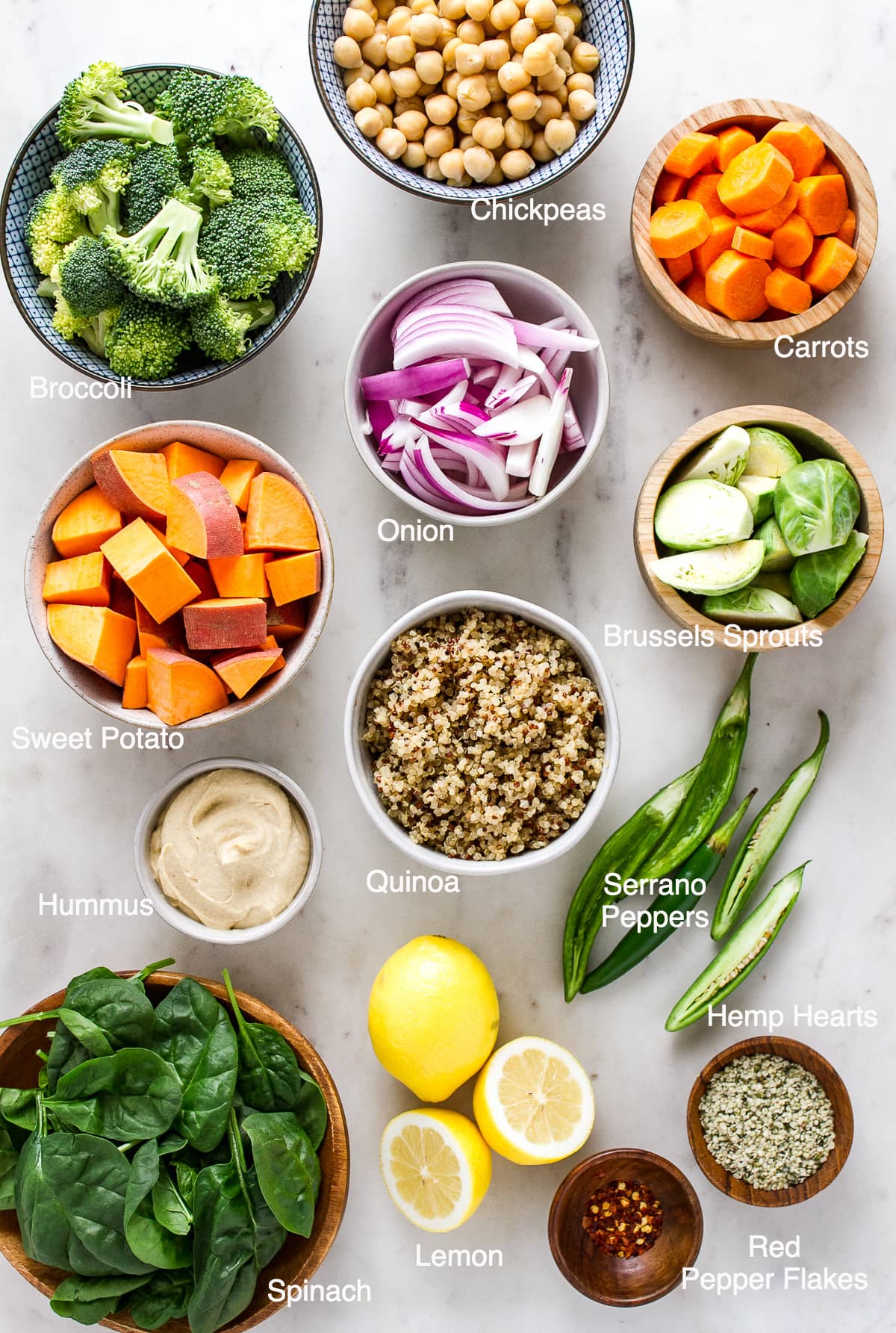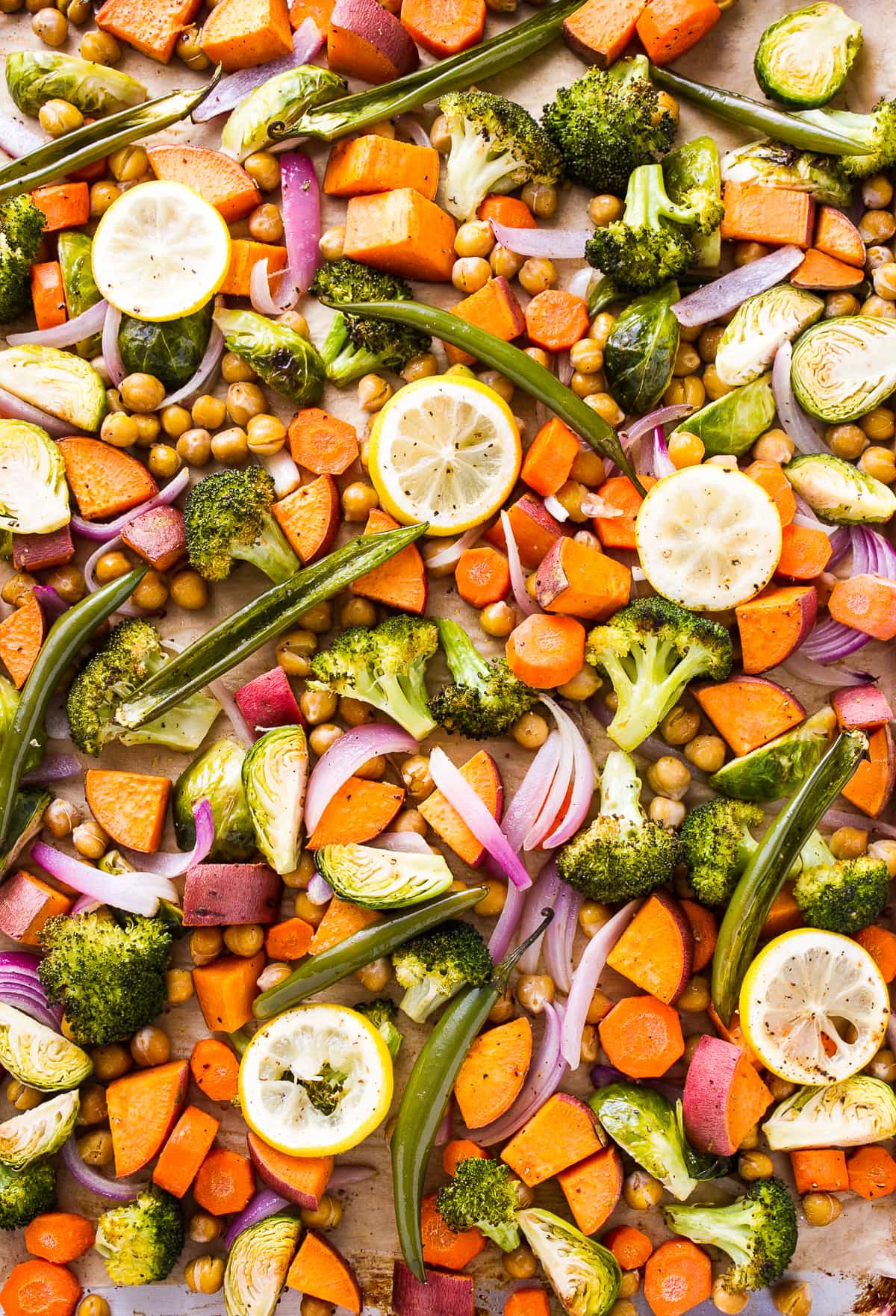Roasted Nourish Bowls
This nutrient-dense Roasted Nourish Bowl recipe features sweet potatoes, brussels sprouts, chickpeas, fresh spinach, quinoa, and avocado! It’s easy to make and ready in under 1 hour.

I shared this Quick & Easy Nourish Bowl last spring, which features fresh vegetables, and thought it would be wonderful to have a roasted version for the cooler months. And I was right, it’s just as well-balanced and delicious!
As the season changes from summer to autumn, I find myself craving warm baked goods and just about anything roasted. At the moment, I’ve been obsessed with making my Vegan Pumpkin Bread.
This easy roasted vegetable bowl is perfect for lunch, dinner, and meal prep. It’s filled with accessible ingredients and so easy to make. And if you’re anything like me, you’ll appreciate the simplicity of this nutrient dense nourish bowl!
Enjoy every bite, and be warm and well-nourished!

Ingredients You’ll Need
There a quite a few vegetables in this nourish bowl recipe. If you can’t get them all in, a various few will be enough. Feel free to add or subtract ingredients to your liking.
- Olive oil. Use your favorite oil or flavor-infused oil.
- Sweet potato. Leave the skin on for the most nutrition, just be sure to scrub them before cutting.
- Carrots. Use baby carrots for ease as you can roast them whole.
- Brussels sprouts. If you don’t care for Brussels sprouts, use one small beet (red or yellow).
- Broccoli florets. Use cauliflower if you prefer.
- Red onion. Any color will do, use your favorite or what you have on hand.
- Serrano chilis. Serrano peppers are optional. I personally love the heat they give and they are wonderful roasted! You can sub 3 jalapeno peppers as well.
- Chickpeas. Use canned for ease or freshly cooked.
- Lemons. Roasted lemons are a great way to add a little extra flavor to roasted vegetables.
- Grain. I paired my nourish bowls with quinoa, but feel free to use white, black, or brown rice, farro, or your preferred grain.
- Hummus. If you don’t have hummus on hand or want to vary it up, try using these dressings and sauces instead: Lemon-Tahini Dressing, Sriracha Cashew Sauce, or tahini-based Dynamite Sauce.
- Hemp hearts. Adds a healthy dose of omegas and other essential vitamins and minerals.
- Red pepper flakes. Add a touch of more heat and sprinkle of color.
- Mineral salt & fresh cracked pepper. Season to taste.

How To Make Roasted Nourish Bowl
- Simply chop your veggies, add them and your beans to a roasting pan, toss in a little oil (or not), add a little salt and pepper, and roast for 35 – 40 minutes at 400 degrees. Once done, your vegetables should be nicely browned on the edges and fork-tender.
- In individual bowls, serve vegetables with 1/3 cup quinoa, a handful of spinach, sliced avocado, and a nice dollop of hummus. Top with a sprinkle of red pepper flakes, hemp hearts a squeeze of roasted lemons.
And that’s it – a tasty sheet pan style nourish bowl that’s a complete & nutrient dense meal!

How To Store Leftovers
Leftovers can be stored in a covered container in the refrigerator for up to 4 – 5 days. For meal prep, these multi-use glass containers (affiliate link) work great!
More Recipes You’ll Love!
- Chimichurri Nourish Bowl
- Fresh Nourish Bowl
- Roasted Buddha Bowl
- Cauliflower & Sweet Potato Buddha Bowl
- Roasted Cauliflower + Chickpeas + Mustard Dressing

If you try this easy bowl recipe, please let me know! Leave a comment and rate it below. I love to hear what you think, or any changes you make.
PrintROASTED NOURISH BOWLS
Keep warm and nourished with this nutrient dense vegetable bowls with sweet potatoes, brussels sprouts, chickpeas and more!
- Prep Time: 10 min
- Cook Time: 40 min
- Total Time: 50 minutes
- Yield: Serves 6
- Category: Entree
- Method: roast, oven
- Cuisine: Vegan
Ingredients
- 1 – 2 tablespoons olive oil
- 1 large sweet potato, cut into 3/4″ cubes
- 2 large carrots, sliced
- 1 1/2 cups brussels sprouts, halved or quartered
- 1 1/2 cups broccoli florets
- 1/2 large red onion, sliced
- 6 serrano chilis, sliced in half and de-seeded
- 1 can (15 oz) chickpeas, drained and rinsed, or 1 1/2 cups cooked
- 1 – 2 lemons, cut into six pieces
- mineral salt & fresh cracked pepper, to taste
To serve
- 2 cups cooked quinoa
- 5 oz. spinach
- 1 – 2 avocados
- big dollop of hummus
- red pepper flakes, to garnish
- hemp hearts, to garnish
Instructions
Preheat oven to 400 degrees F.
Prepare vegetables: remove any unsightly spots on the sweet potato skins before cubing, peel the carrots if needed and half or quarter the brussels sprouts depending on the size.
Roast: Place vegetables, chickpeas and lemon in a large roasting pan or rimmed baking sheet. Toss with oil and sprinkle with salt & pepper to taste. Roast for 40 – 45 minutes, stirring halfway through. Vegetables should be slightly browned on the edges and fork tender. Remove from oven and let cool a few minutes.
Serve: In individual bowls, serve vegetables with 1/3 cup quinoa, handful of spinach, sliced avocado and a nice dollop of hummus. Top with a sprinkle of red pepper flakes, hemp hearts a squeeze of roasted lemons.
Serves 6
Store: Keep leftovers in the refrigerator for up to 3 – 4 days, in a covered container. For storing and meal prep these multi-use glass containers (affiliate link).
Notes
Vegetables can vary in quantity. Add or subtract to your liking.
Change up the quinoa with Farro, spelt berries, brown rice, white rice or barley.
If you have a favorite herb or herb blend, you may consider adding a dash or two to the veggies before roasting.
Serrano peppers are optional. I personally love the heat they give and they are wonderful roasted! You can sub 3 jalapeno peppers as well.
If you don’t have hummus on hand or want to vary it up, try using these dressings and sauces instead: Lemon-Tahini Dressing, Sriracha Cashew Sauce, tahini based Dynamite Sauce or Creamy Tahini Hippie Sauce, For a non-creamy dressing, try this Shallot Vinaigrette.
Cooking quinoa: I had a comment about cooking quinoa so here is my recipe for perfect quinoa.
In a medium size pot, bring 1 3/4 cup water + 1 cup quinoa to a boil, cover, reduce heat to low and simmer for 15 minutes. Once done, turn off heat, remove cover, fluff with fork and let set 10 – 15 minutes.
Perfect quinoa every time! Makes about 3 cups. Feel free to add a little seasoning to the quinoa before cooking like garlic powder, thyme, garlic salt, mineral salt, lemon pepper, everyday seasoning, etc. Or simply season once done. This will give you more than called for in the recipe…leftovers can be served chilled or warmed with your favorite vegetables or fruits.
FOLLOW TSV on Facebook, Instagram, Pinterest, Youtube, Subscribe (email), or RSS for more recipes and inspiration!


Delicious! Simple and filling.
This is my new favorite meal. We cook it 2 to 3 times a month. It is simple, filling, delicious, and leaves me feeling great! This is a real winner, thanks 😊
I have made this twice now and it's really delicious. It's especially satisfying in the cold winter months. Bonus: it makes my house smell amazing! Thanks so much!:)